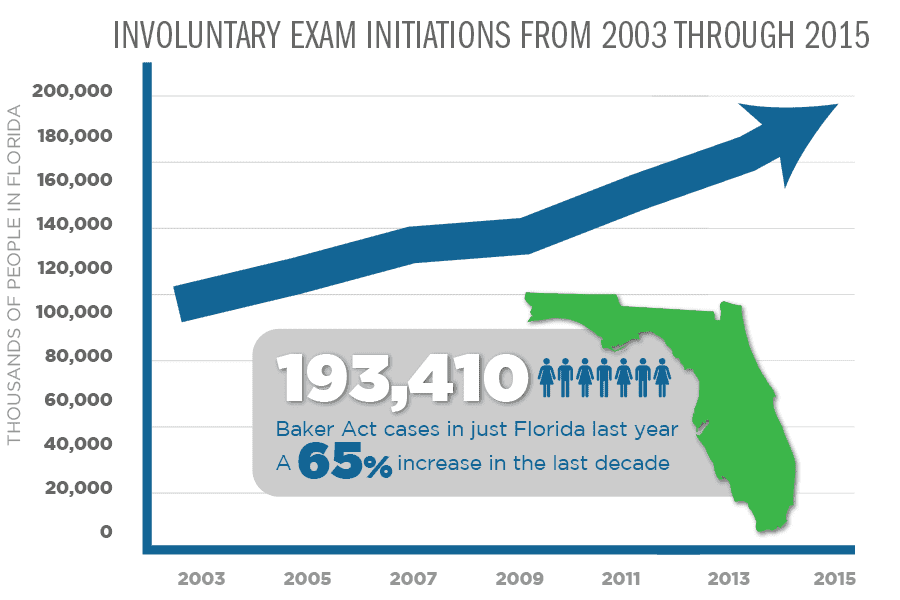The Florida Mental Health Act of 1971—also known as the Florida Baker Act—is a statute that allows for the examination and involuntary or emergency commitment of an individual who is suffering from a mental health disorder. The Baker Act can be initiated by law enforcement, court judges, physicians, or mental health professionals. There must be substantial evidence that an individual has a mental disorder, or there is intent to harm oneself or others or be self-neglectful.
The Marchman Act is similar, in that it allows for an individual to be involuntarily committed, but rather for substance abuse. The Marchman Act can be enacted when an individual no longer has control over their addiction, thereby being a danger to themselves and others. The Baker Act and Marchman Act are both effective at helping those who are in dire need of treatment, begin the recovery process.
The Baker Act and Marchman Act
Not only is addiction terrifying for the individual, but it also affects loved ones. Alcoholism, drug addiction and families don’t mix. Those with drug or alcohol addictions often cannot see the need for treatment or refuse to participate in their recovery.

Fortunately, there are other options for getting a family member or a friend the help they desperately need. This can include an involuntary commitment with the Baker Act and the Marchman Act.
While the first steps of getting loved ones into treatment are usually coaxing or interventions held by family and friends, sometimes the offers and ultimatums are ultimately rejected. In these cases, these special legal actions to force an individual into substance abuse or mental health treatment may be the only option.
Which States Have The Marchman Act and Baker Act?
The Baker Act and Marchman Act have saved countless lives in the past. Additionally, these include those who have attended Ambrosia’s addiction treatment facility in South Florida. It may be the best course of action to save someone’s life.
The majority of states offer the Baker Act and Marchman Act including the following states:

- Alaska
- Arkansas
- California
- Colorado
- Connecticut
- Delaware
- District of Columbia
- Florida
- Georgia
- Hawaii
- Indiana
- Iowa
- Kansas
- Kentucky
- Louisiana
- Maine
- Massachusetts
- Michigan
- Minnesota
- Mississippi
- Missouri
- Nebraska
- North Carolina
- North Dakota
- Ohio
- Oklahoma
- Pennsylvania
- South Carolina
- South Dakota
- Tennessee
- Texas
- Virginia
- Washington
- West Virginia
- Wisconsin
Involuntary Commitments
Almost all states have similar involuntary commitment standards to the Baker Act and Marchman Act. These can include both inpatient and outpatient care. Since these laws vary on a state level, the criteria for filing can vary as well.
- California– 5150 (72-hour hold)
- Pennsylvania– 302 (5-day hold)
- Ohio, Indiana, Kentucky– Casey’s Law
- New Jersey– Assisted Outpatient Treatment (AOT)
- New York– Kendra’s Law
Involuntary care is a tough situation for everyone involved. No one wants to be held against their will, but being proactive versus reactive in these situations can potentially save a life. An individual who needs treatment must get the help they deserve. When all else fails, a push in the right direction can be a turning point toward recovery.
The Baker Act
Used to get a loved one emergency psychological care
Formally known as the Florida Mental Health Act of 1971, this statute provides involuntary mental health examination to an individual who either;
- Is believed to have a mental illness
- Is of harm to themselves or others (includes self-neglect)
While a person is able to Baker Act themselves, most of the time a Baker Act is initiated by doctors, judges, or police officers. During a crisis situation, such as threats of suicide or self-harm, a third party can submit an affidavit to get an individual “baker-acted” through the circuit court.
“Mental illness means an impairment of the mental or
emotional processes that exercise conscious control of one’s
actions or of the ability to perceive or understand reality,
which impairment substantially interferes with a person’s
ability to meet the ordinary demands of living, regardless
of etiology. For the purposes of this part, the term does not
include a developmental disability as defined in Chapter
393, intoxication, or conditions manifested only by
antisocial behavior or substance abuse impairment.”
– The Florida Mental Health Act of 1971 – F.S. §394.455
The Process
1. The individual is committed by means of a law enforcement officer, a physician, or a sworn affidavit from another individual.
2. A law enforcement officer takes the person into custody and transports them to a receiving mental health facility.
3. The individual is examined and placed on a psychiatric hold for no more than 72 hours.
4. The patient is given a mental health evaluation and further treatment is recommended based on the results.
The Florida Mental Health Act provides an option for loved ones who recognize that action must occur before an individual hurts themselves or others. It is not uncommon for addicts and alcoholics to feel so hopeless and helpless that they turn to suicide.
The Baker Act is a legal way to avoid this tragic end, and give assistance to a loved one when they cannot or will not make the decision for themselves. While it can seem extreme, involuntary commitment to psychiatric care has saved many addicts and alcoholics in the past and continues to serve as a necessary push into recovery for those who need it.
The Marchman Act
Used to get a loved one into substance abuse treatment
Florida’s Marchman Act is a statute that assists families in getting their loved ones court-ordered and monitored stabilization and long-term treatment for substance abuse. Enacted in 1993, this law allows for the involuntary assessment, stabilization, and treatment for those who are deemed unable to make the decision for themselves.
“Substance abuse is a major health problem with profoundly disturbing consequences such as serious impairment, chronic addiction, criminal behavior, vehicular casualties, spiraling health care costs, AIDS, and business losses.
A disease which affects the whole family and the whole society requires specialized prevention, intervention, and treatment services that support and strengthen the family unit.”
– The Florida Marchman Act – F.S. §397.305
The Process
1. A sworn affidavit is signed at the local county courthouse or clerk’s office.
2. A hearing is set before the court after a Petition for Involuntary Assessment and Stabilization is filed.
3. Following the hearing, the individual is held for up to five days for medical stabilization and assessment.
4. A Petition for Treatment must be filed with the court and a second hearing is held for the court to review the assessment.
5. Based on the assessment and the recommendation that the individual needs extended help, the judge can then order a 60-day treatment period with a possible 90-day extension, if necessary.
6. If the addict exits treatment in violation of the judge’s order, the addict must return to court and answer to the court as to why they did not comply with treatment. Then the individual is returned immediately for involuntary care.
7. If the addict refuses, they are held in civil contempt of court for not following treatment order and are ordered to either return to treatment or be incarcerated.
The Reality — In many cases the threat or initial filing of the Marchman Act is enough to get reluctant addicts to agree to treatment, to avoid the legal and personal hassle.
Because addiction is a medical condition, the process is strictly confidential. All hearings are held in closed courtrooms, and all assessment and treatment records are protected by Federal HIPPA law.
How to Have Someone Involuntary Committed
Both of these statutes are specific to the state of Florida. However, every state has laws for involuntary commitment on some level.
Filing will never be included on an individual’s legal record. The intent of the Marchman Act is treatment, not punishment.
Someone who is “Baker Acted” goes to a receiving center. This is a hospital or mental health facility that has been designated as qualified to treat Baker Act patients.
The individual filing must demonstrate that the person in question has lost the power of self-control in regards to their substance abuse and has refused to seek voluntary care.
In most counties in Florida, the required paperwork can be filed at the courthouse for that county. Usually, this paperwork and any sworn testimony are taken care of with the county clerk’s office. Often there is a specific department for mental health, probate, or similar services.
The following parties can petition the court for a Marchman Act:
- Spouse
- Blood relative (mother, father, sibling, etc.)
- Any three people who have direct knowledge of the individual’s substance abuse
(The law permits three people who have the independent knowledge of the person’s substance abuse because of cases where family members are not in the picture).
Although initially these statutes were enacted to assist those suffering from mental illness, they have been reformed and expanded to help those with severe substance use disorders. At Ambrosia Treatment Centers, we understand the complexity of substance use disorders and the damaging effects for the user, as well as their family and friends.
If you have questions about both the Baker Act and Marchman Act, and whether or not an involuntary commitment for a loved one is the right option, contact our admissions page today.




